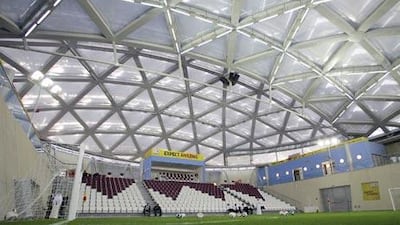ZURICH //Qatar today stands on the brink of earning a historic distinction for Arab nations as football's international governing body decides where the 2022 World Cup should be staged.
On the eagerly awaited day, the executive committee of the International Federation of Association Football (Fifa) will also vote on whether the 2018 tournament should take place in England, Russia, Spain and Portugal or Belgium and the Netherlands.
Lobbying was continuing late into the night in Zurich hotels in last-ditch attempts to persuade committee members representing football around the world to confirm or change voting intentions on the venues for both events.
The battle to host the 2018 finals has attracted widespread attention, not least because of fears that reporting by the British media of alleged corruption involving Fifa members could provoke an anti-England backlash.
But there is excitement throughout the Middle East at the possibility that Qatar will, in 2022, become the first country from the region, and the first Muslim nation, to host football's grandest tournament.
Along with its 2022 rivals – the United States, South Korea, Japan and Australia – Qatar made its final presentation in Zurich yesterday.
Critics of the Qatari bid have included the authors of Fifa’s technical report, who listed 40°C-plus temperatures in June and July among the drawbacks.
But, in its closing submissions, Qatar reaffirmed its commitment to provide ideal conditions for both players and supporters. The advanced technology of stadiums, all located close to one another and capable of being dismantled and shipped to poorer countries after the tournament, was given special emphasis.
“All our stadiums, training sites and fan zones will be at 27 degrees C, all solar-powered and 100 per cent carbon neutral,” said Hassan al Thawadi, the leader of the Qatari effort. “The application for this technology goes far beyond stadiums. Heat will not be an issue, whatever the climate, and we want this to be a global, lasting legacy.”
The Gulf state has also enlisted charismatic individuals from the world of football to bolster its campaign.
Zinedine Zidane, a World Cup winner for France but of Algerian parentage, has featured in television advertisements in Switzerland, urging that football be recognised as a game “for everyone” in which the Middle East should now get its big chance.
Qatar’s financial muscle, and the goodwill of such stars, has given it hope of beating the other 2022 contenders. And for one leading British bookmaking firm, Qatar is the front runner.
Among the countries potentially standing in the way, South Korea, Japan and the US could find their efforts hampered by the knowledge that they have all hosted World Cups in the recent past (2002 in South Korea and Japan, 1994 in the US). Qatar has never even qualified for the tournament’s final stages, though Australia also fancies its chances, brashly offering to stage the 2022 event in “the world’s greatest playground”.
The star factor was made a more-or-less obligatory aspect of venue-choosing sporting summits when Tony Blair, then British prime minister, mounted a determined lobbying exercise in Singapore to clinch the 2012 Olympics for London.
The former US president Bill Clinton is in Zurich pleading his country’s case for the 2022 World Cup, while England’s 2018 charm offensive is underpinned by the presence of the prime minister, David Cameron, the second-in-line to the English throne, Prince William, and one of the world’s most famous footballers, David Beckham.
However, the Russian prime minister, Vladimir Putin, has injected additional controversy into the proceedings by pointedly staying away and letting it be known he considered his country had come up against “unscrupulous competition”.
Some observers regarded Russia as England’s toughest competition. There is speculation – but no more than that in a contest whose outcome is simply impossible to predict – that Mr Putin’s snub may restore the joint Spain/ Portugal bid as the biggest stumbling block to English hopes.
Mr Cameron has sought to deflect attention from the row caused by the British Broadcasting Corporation’s insistence on screening a documentary, just three days before today’s vote, alleging corruption by Fifa members. He says he travelled to Zurich to talk up England’s bid, and for no other purpose.
But the BBC's defiance caused dismay to England bid officials, who feared further possible damage following earlier cash-for-votes claims by the UK's biggest selling quality paper, The Sunday Times.
Fifa made light of the BBC report, saying it re-examined matters investigated several years ago and did not lead to any prosecutions. It had previously criticised The Sunday Times for the manner in which it accused two executive committee members of separate wrongdoing. Yet Fifa also took the claims seriously enough to suspend the delegates concerned, reducing today's committee strength to 22.
English football fans and even the media are divided. Many fans accuse journalists of lacking patriotic spirit; the tabloid The Sun, a stablemate of The Sunday Times, launched a ferocious attack on the BBC, with a headline depicting the initials as standing for Brainless, Betraying Cretins. But The Independent said Fifa, and not the BBC, should be "facing British, and world, opprobrium".
In Switzerland's largest city, huddled against the wintry chill, one of the few certainties last night was that recriminations would continue for some time after Fifa's president, Sepp Blatter, announces the winners and losers later today.
crandall@thenational.ae
* With additional reporting by Reuters


